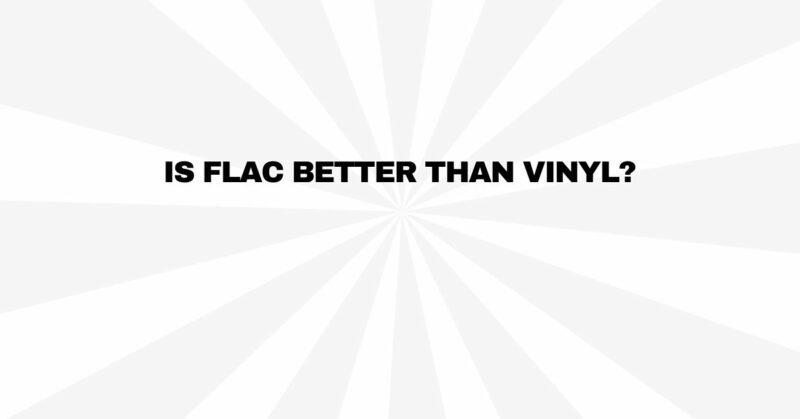The debate over audio formats has evolved significantly with the advent of digital technology and the resurgence of vinyl records. FLAC (Free Lossless Audio Codec) and vinyl are two distinct formats that offer unique listening experiences. To determine whether FLAC is better than vinyl, we need to consider various aspects of audio quality, convenience, and personal preferences.
Understanding FLAC:
FLAC is a digital audio format known for its lossless compression. Unlike lossy formats like MP3, which discard some audio data to reduce file size, FLAC preserves all the audio data during compression. This results in high-quality, bit-for-bit audio reproduction.
Key features of FLAC include:
- Lossless Compression: FLAC achieves high compression ratios without any loss of audio quality. This means that when a FLAC file is decoded, it exactly replicates the original audio data.
- Digital Precision: FLAC files offer a high level of digital precision. They capture the entire frequency range and dynamic range of the original recording.
- Convenience: FLAC files are compact and do not degrade in quality with repeated playback. They can be easily stored on digital media, streamed over the internet, and played on a wide range of devices with compatible software or hardware.
- Durability: Digital files like FLAC are resistant to physical wear and tear, making them a durable format for archiving and long-term storage.
Understanding Vinyl Records:
Vinyl records, on the other hand, are an analog audio format that stores music in grooves etched onto the surface of a vinyl disc. Vinyl records have been praised for their analog warmth and character, which stems from their continuous waveform representation. Key features of vinyl records include:
- Analog Warmth: Vinyl records are celebrated for their analog warmth, character, and imperfections. This warmth adds depth and emotional resonance to the music.
- Tactile Engagement: Playing vinyl records involves a tactile and hands-on experience, enhancing the connection to the music. Selecting a record, placing the needle, and watching the disc spin create a unique ritual.
- Dynamic Range: Vinyl records often have a wide dynamic range, capturing and reproducing subtle nuances in music.
- Imperfections: Vinyl’s imperfections, including surface noise, pops, and clicks, are considered part of its charm by enthusiasts. These analog quirks contribute to a more authentic and engaging listening experience.
Comparing FLAC and Vinyl:
To determine whether FLAC is better than vinyl, we must consider various factors:
- Audio Quality: FLAC files offer pristine digital audio quality with no loss of data. Vinyl, while known for its analog warmth, can introduce imperfections and noise during playback.
- Convenience: FLAC files provide convenience in terms of portability, storage, and playback. Vinyl records require physical storage space and playback equipment, which may not be as accessible or practical for all listeners.
- Tactile Experience: Vinyl records offer a unique tactile engagement that some listeners find deeply satisfying. This physical interaction with the medium is not replicated by digital formats.
- Subjective Preference: The preference for FLAC or vinyl often depends on individual tastes. Some listeners prioritize the precision and convenience of digital formats, while others value the analog warmth and character of vinyl records.
- Equipment: The quality of playback equipment significantly affects the listening experience. High-end turntables and cartridges can maximize the potential of vinyl records, while high-quality DACs and amplifiers can enhance FLAC playback.
Conclusion:
The question of whether FLAC is better than vinyl is complex and ultimately depends on individual preferences, priorities, and the listening experience one seeks. FLAC offers digital precision and convenience, making it a popular choice for archiving and playback. Vinyl records, on the other hand, provide a unique analog warmth and tactile engagement that many enthusiasts cherish.
Ultimately, the choice between FLAC and vinyl comes down to the specific qualities one values in their listening experience. Some listeners may prefer the clinical accuracy of digital formats, while others are drawn to the warmth and authenticity of analog playback. Both formats have their place in the world of audio, ensuring that listeners have diverse options to suit their individual tastes and lifestyles.


